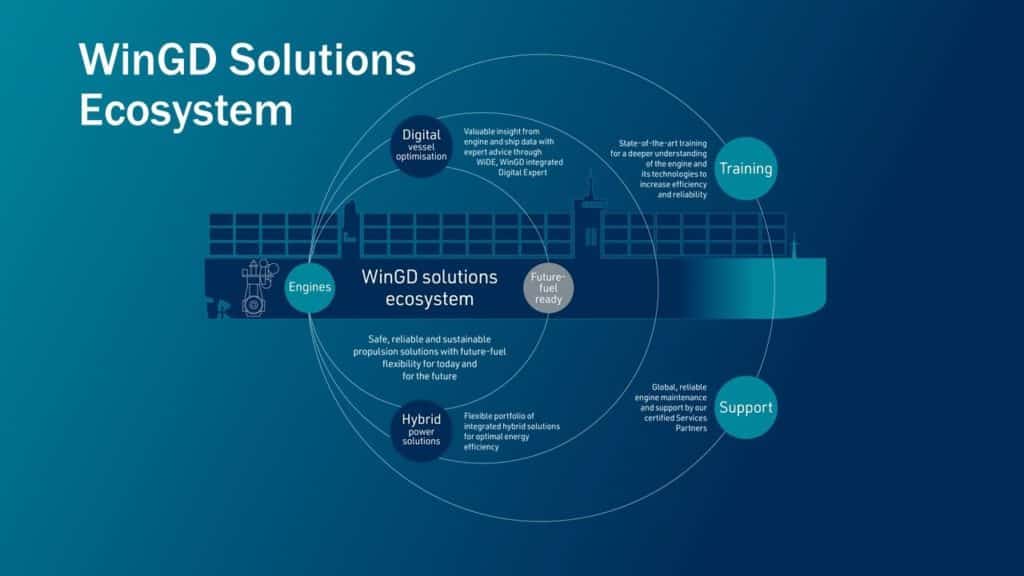
[ad_1]

Engine developer WinGD has developed an ecosystem of solutions around the main engine that enhances energy efficiency and enables a seamless transition to new fuels – the two keys to reducing greenhouse gas (GHG) emissions in line with International Maritime Organization ambitions.
The WinGD solutions deploy digital vessel optimisation and battery-hybrid energy systems to improve the energy efficiency and future fuel flexibility of its two-stroke engines. Using LNG as fuel in a low-pressure X-DF engine, for instance, can reduce GHG emissions by around 20% compared to a conventional two-stroke engine burning heavy fuel oil. Combined with the new solutions, CO2 equivalent emissions can be reduced even further – taking vessels beyond IMO’s intermediate target of reducing carbon intensity by 40% by 2030.
“Our ecosystem approach to energy efficiency acknowledges that vessels today are complex power systems with the main engine at the heart of the integrated solution,” said Klaus Heim, CEO, WinGD. “These systems, including our engines, are fully ready for the future fuels that will take ships much further than IMO’s target of cutting greenhouse gas emissions by at least 50% by 2050.”

Click to Enlarge | Image Credits: WinGD
The solutions include fuel flexibility and smart engine monitoring combined with advanced electronic control and hybrid energy management systems. WinGD’s engine expertise means that it can integrate all elements of these complex systems optimally, including advising ship owners on the sizing and operation of hybrid energy sources such as batteries.
In a recent landmark project, WinGD is integrating sustainability and efficiency enhancements through a hybrid energy system onboard four pure car and truck carriers ordered by Japanese owner NYK Line. The vessels will run on LNG, using WinGD’s 7X62DF-2.1 two-stroke engines coupled with shaft generators, DC links and battery systems. WinGD has optimized spinning reserves, peak shaving, and energy flow to run the main engine at its sweet spot as much as possible while reducing the use of less efficient auxiliary engines. The system will be managed by WinGD’s new Hybrid Control System.
“Such integrated energy management plays a key role in our vision to power the energy transition in shipping.” said Mr Heim. Through WinGD’s progressive investments in future fuels, engine control, optimisation and hybridisation, combined with the continued evolution of our core engine technology, these advances give ship owners certainty that they can meet long-range environmental targets with systems they can order today.”
Underlying the new offering is WinGD’s Integrated Digital Expert (WiDE), a cutting-edge engine monitoring and optimisation solution that is standard on all medium and large bore WinGD engines. The monitoring and support capabilities work with a robust, modern control system – WinGD Integrated Control Electronics (WiCE) – that meets the connectivity and security demands of future ship energy systems. Combined with WinGD expert training for operators and a global service network, customers are fully equipped to meet the challenges that lie ahead.
While developing the wider ecosystem of solutions, WinGD has continued to focus on the performance and sustainability of vessels powered by its engines. The emissions advantages of their dual-fuelled X-DF two-stroke series have been enhanced through the introduction of intelligent Cooling and Exhaust Recirculation (iCER), which cuts methane slip by around 50% as well as improving fuel consumption in both gas and diesel modes.
The X-DF engine can already run on carbon-neutral fuels including biogas or synthetic LNG without engine modifications, preparing ship owners for the next stage in their transition to lower carbon operations. As the most widely deployed low-pressure dual-fuel technology in the marine two-stroke market, it is the ideal platform around which to build a future-ready energy system fit for the next generation of low-emission vessels.
The benefits of future fuel flexibility and potential hybridization are not limited to gas-fuelled engines. WinGD’s X engines are powered by liquid fuels, of which there are several emerging carbon-neutral or zero-carbon candidates, including bio-diesel and alcohol fuels. The company has invested extensively in preparing to use these fuels, including leading European research into injection concepts. The core engine offering is continuously being developed to improve efficiency and flexibility, most recently with the addition of the first integrated, on-engine NOx abatement solution in the marine two-stroke engine market.
Press Release
WinGD Takes Holistic Approach To Marine Decarbonisation With Ecosystem Of Solutions appeared first on Marine Insight – The Maritime Industry Guide
[ad_2]
This article has been posted as is from Source